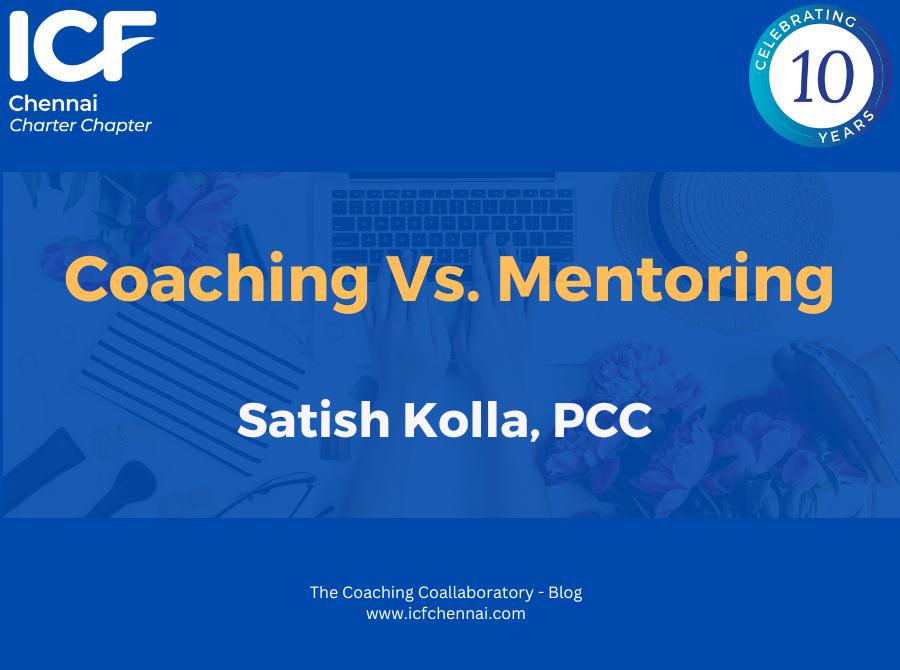Coaching vs Mentoring

by Leela VenkataSatish Kolla
“You’re a Coach. You’re supposed to tell us what is that we have to do”.
There’s a very big misconception about the term ‘Coaching’, especially from the Agile implementation perspective at the organizations. This could be because of the term “Agile Coach”, where the so-called coach is expected to help drive the agile transformation by training, mentoring and coaching the teams, leadership and stakeholders in the ways of working. However, considering the role coach, they’re expecting the same from the ICF coaching perspective as well.
For an individual like me coming from Agile coaching background, it took lot of time and effort to break the system. Before and during every coaching conversation, I set the context of my role as a coach, and what they can expect from my side. Some get confused, some get surprised, and some expect me to answer their questions, queries on their career related pointers.
“Which certification should I opt for?” “Who’s the best trainer?” “What’s the ROI I get by doing the course?” “Can anyone help me with the career transition?”
These are some of the most common questions I receive from the clients during the coaching conversation. At that point of time, I ensure the focus on coaching agreement and ask them are they still looking for a coaching conversation, or they wanted me to be a mentor in case they’re looking for any guidance. Again, I clarify between the role of Coach and Mentor, which helps them get some sort of clarity around the roles.
As per my observation, 80% of the times folks tend towards coaching, whereas 20% wants instant responses. Even now, in some of my coaching conversations, folks join with the assumption that I’m there to provide the answers, solutions for their challenges and issues.
What I’ve learned from these experiences is that clarity is everything.
Coaching isn’t about wearing a “guru” hat and handing out answers on a silver platter. It’s about holding space where clients can explore, reflect, and ultimately arrive at their own solutions. Mentoring, on the other hand, is about drawing from my own experiences and offering guidance or advice when someone is seeking a more direct path.
It’s easy to assume there’s a clear line between the two—but in reality, that line gets blurry fast when expectations aren’t aligned. My biggest takeaway? Never assume both parties see the conversation through the same lens. Setting the context early helps avoid disappointment and confusion later.
For those who lean into coaching (and trust me, that’s still the majority), they discover something deeper—confidence in their own ability to make decisions, clarity in their thought process, and an increased sense of ownership over their journeys. Coaching allows them to untangle their own webs instead of relying on someone else to do it for them.
For the folks who prefer mentoring—there’s value in that too. Sometimes people simply need a nudge, a direction, or a sounding board from someone who’s already walked the path. And that’s okay.
The outcome for me? Patience and adaptability. Every conversation is different. Not everyone is ready for coaching, and not everyone needs a mentor. My role is fluid—it shifts based on their needs and the openness of the conversation.
Ultimately, the key isn’t about fitting people into predefined frameworks. It’s about meeting them where they are, offering what’s needed, and recognizing that both coaching and mentoring have their rightful place in the growth process.
Satish Kolla
The views and opinions expressed in guest posts featured on this blog are those of the author and do not necessarily reflect the opinions and views of the International Coach Federation (ICF). The publication of a guest post on the ICF Blog does not equate to an ICF endorsement or guarantee of the products or services provided by the author.
Additionally, for the purpose of full disclosure and as a disclaimer of liability, this content was possibly generated using the assistance of an AI program. Its contents, either in whole or in part, have been reviewed and revised by a human. Nevertheless, the reader/user is responsible for verifying the information presented and should not rely upon this article or post as providing any specific professional advice or counsel. Its contents are provided “as is,” and ICF makes no representations or warranties as to its accuracy or completeness and to the fullest extent permitted by applicable law specifically disclaims any and all liability for any damages or injuries resulting from use of or reliance thereupon.


Writing in the context of Agile coaching and sharing your experience in that context is much appreciated. However, one suggestion was on the heading could have been different. It gave me a feeling that you are discussing the broad differentiation on coaching and mentoring with some valid cases. Thanks once again.